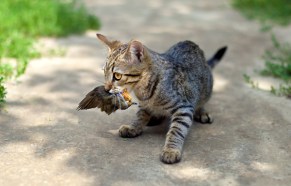News
-
 Space
SpaceScale weighs black holes better than before
Microwave telescopes on the ground determine the masses of supermassive objects millions of light-years away.
By Andrew Grant -
 Humans
HumansSome chores linked to less sex
Husbands who do more household chores make love less often, a new study suggests.
By Nathan Seppa -
 Humans
HumansPublished clinical trials shown to be misleading
A comparison of internal and public reports about Pfizer’s drug Neurontin reveals many discrepancies.
-
 Animals
AnimalsCats kill more than one billion birds each year
New analysis doubles estimate of avian death tolls, revealing that hunting felines take bigger bite out of wildlife than expected.
By Susan Milius -
 Life
LifeCaribbean’s coral reefs approach tipping point
A survey of 19 colonies suggests many may soon begin to shrink.
-
 Life
LifeChimps’ baby teeth don’t predict weaning
The age at which a chimpanzee gets its first molar tooth doesn't predict when it will stop nursing.
By Erin Wayman -
 Earth
EarthHuman-made waste heat warms climate
Energy dissipated as heat in cities can cause regional temperature changes, simulations suggest.
By Erin Wayman -
 Health & Medicine
Health & MedicineDeep brain stimulation improves autistic boy’s symptoms
Electrodes surgically implanted in the brain could treat severe cases of autism.
-
 Space
SpaceProton’s radius revised downward
A new study confirms an earlier result that found that the proton is smaller than thought, opening up the possibility of undiscovered particles and forces.
By Andrew Grant -
 Animals
AnimalsDung beetles steer by the Milky Way
The insects orient themselves using starlight, researchers find in planetarium experiments.
By Susan Milius -
 Humans
HumansSTS finalists bound for Washington
Forty vie for top awards in 2013 Intel Science Talent Search.
By Matt Crenson -
 Health & Medicine
Health & MedicineDigestive juices implicated in shock
A new study finds that blocking enzymes' effects beyond the gastrointestinal tract may be an effective treatment strategy.
By Nathan Seppa